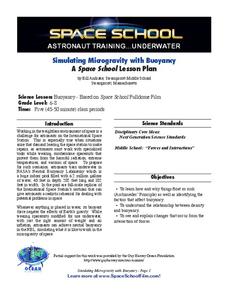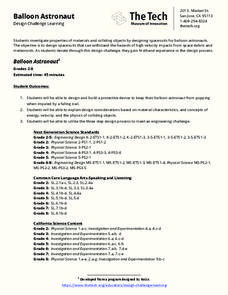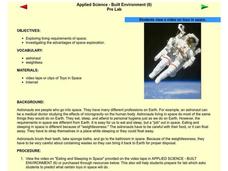American Institute of Physics
Meet Four Pioneering African American Astronauts
An out-of-this-world resource introduces young scientists to four African American astronauts: Michael P. Anderson, Ronald E. McNair, Guion S. Bluford Jr., and Jeanette J. Epps. Groups read biographies of these individuals and prepare...
Curated OER
What's Out There? Space Shuttle Exploration and Simulation
Learners simulate life in space aboard the space shuttle. In this space exploration lesson, students work in small groups to model life aboard the space shuttle. Each student is given a job, conducts Internet research on space, and...
Florida International University
Simulating Microgravity with Buoyancy
How do astronauts know how to live and work in a weightless environment? It doesn't come naturally! Junior physicists conduct experiments to examine the link between buoyancy and microgravity. Each activity illustrates a different aspect...
BioEd Online
Muscles and Bones in Space
Being an astronaut takes not only high mental acuity, but also a high level of physical fitness, especially for those who spend a long amount of time away from Earth, such as the astronauts serving on the International Space Station....
Curated OER
Mission to Mars
Students consider the affects of space travel on the human body. In this human physiology lesson, students compare how the 5 different body systems work on Earth and in Space. Students then design a product that an astronaut could use as...
Curated OER
Canadian Astronauts and Astronomers
Students research the web for Canadian nationals such as Marc Garneau, Roberta Bandar and Chris Hadfield who have contributed to science and technology. In this Astronauts and astronomers activity, students work in groups and are...
Tech Museum of Innovation
Balloon Astronaut
Design protection from high-speed particles. The STEM lesson plan highlights why astronauts need protection from space debris. Pupils use the design process to design, build, and test a spacesuit that will protect a balloon from a...
Curated OER
Ask an Astronaut
Students read what questions have already been asked from the archives. They then categorize what is already known (each student should be able to give a question which has already been asked and answered), what they would like to know,...
Curated OER
Spuds in Space
Students explore the effects of velocity on an object when it collides with another object. They design and outfit a potato astronaut in a spacesuit to withstand the hazards of high velocity impacts from space debris and meteoroids.
Curated OER
Food for Spaceflight
When astronauts get hungry in outer space, they can't just call and have a pizza delivered. In order to gain an appreciation for the challenges associated with space travel, young learners are given the task of selecting, testing, and...
Curated OER
TE Activity: Muscles, Muscles Everywhere
Young scholars study three different muscle types and investigate the affect of space travel on astronauts' muscles. They examine how exercise has a positive affect on muscle both on Earth and in space while looking at engineers' roles...
Curated OER
Lunch in Outer Space!
Students explore the challenges astronauts face while eating in outer space. In small groups, they design and construct an original model device to assist astronauts eat in a microgravity environment.
Curated OER
The Science of Sleep and Daily Rhythms: Sleeping in Space
Students write about strange places that they have slept. For this sleep science lesson students read about astronauts sleeping experience in space. They reflect on unusual places that they have slept and write about it.
Curated OER
Astronauts Train in Deep-Space Brine
Students examine an article on astronauts training in deep space brine then discuss what they learned. For this investigative lesson students get into groups and design an exercise that includes isolation, silence and conflict resolution.
Teach Engineering
Manned Mission to Mars
To go or to not to go — the question for a mission to Mars. This resource provides details for a possible manned mission to Mars. Details include a launch schedule, what life would be like on the surface, and how the astronauts would...
Center of Excellence for Science and Mathematics Education
A Sick Astronaut
Aspiring astronauts graph, interpret, and analyze data. They investigate the relationship between two variables in a problem situation. Using both graphic and symbolic representations they will grasp the concept of line of best fit to...
Curated OER
Cool Suits
Students examine the materials that are used to make space suits. They complete an experiment in which they test different materials in different colors to determine the best one for keeping astronauts comfortable. They analyze the data.
Curated OER
Space Exploration Narrative
Fourth graders role-play a space exploration. They read scripts detailing an astronaut's journey on a space exploration. They discuss how it felt to be an astronaut, the emotions, moods and feelings of going on a space exploration.
Curated OER
People and Space
Students eat dehydrated foods that the astronauts would eat in space. In this dehydrated foods lesson plan, students make lists of food they could eat, discuss how dehydration takes place, eat food, and complete discussion questions.
NASA
Cleaning Water
From their sweat to the water vapor in their breath, astronauts recycle every possible drop of water while in space. After watching a short video describing the different ways materials are recycled and reused in space shuttles, young...
Curated OER
Space Flight Simulation
High schoolers engage in the study of flight with the help of a computer flight simulation. They take part in a variety of activities that imitate the Space Shuttle Endeavor. Students work as teams like the astronauts would to complete...
Curated OER
Living in Space
Students explore space science by viewing a video in class. In this astronaut lesson, students identify the living habits of astronauts by researching the NASA website and observing a space science video in class. Students participate in...
Messenger Education
Mission: Possible—How Can We Plan an Exploration of Another World?
An astronaut's spacesuit weighs 280 pounds and takes 45 minutes to put on — that's a serious suit! The second activity of a three-part series allows pupils to see all that goes into space exploration. Through simulations, groups analyze...
University of Colorado
Planetary Distances on the Playground
Earth is 149,600,000 km, or 92,957,130.4 miles, from the sun. Young astronauts create an interactive model to learn the distances between planets. Nine groups, each representing a different planet, are spread around at class-calculated...

























